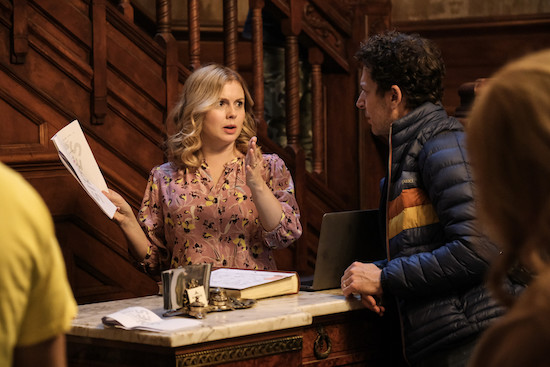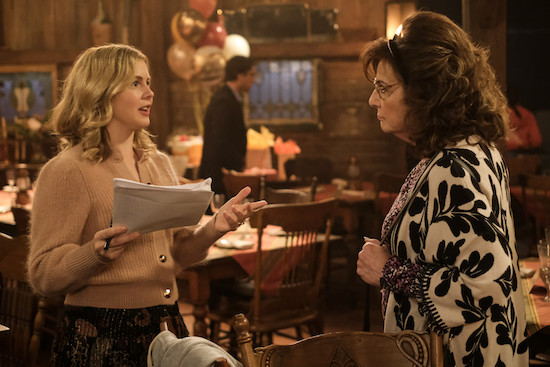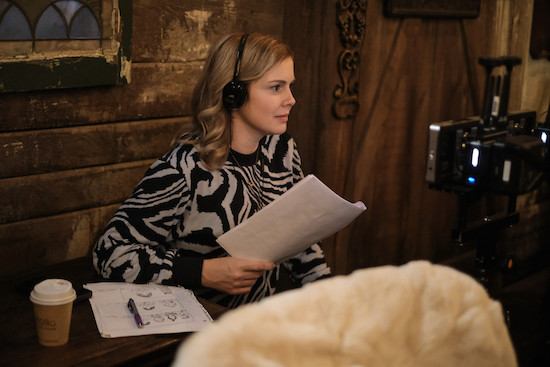GHOSTS: Rose McIver on the Joys and Challenges of Making Her Network TV Directing Debut
February 18, 2025 by Marisa Roffman

“Ghostsfellas” – Jay angers a local restaurateur when he uses a recipe at his restaurant that was given to him by Pete, on the CBS Original series GHOSTS, Thursday, Feb. 20 (8:31-9:01 PM, ET/PT) on the CBS Television Network, and streaming on Paramount+ (live and on demand for Paramount+ with SHOWTIME subscribers, or on demand for Paramount+ Essential subscribers the day after the episode airs)*. Series star Rose McIver directed the episode. Pictured (L-R): Director Rose McIver. Photo: Bertrand Calmeau/CBS ©2024 CBS Broadcasting, Inc. All Rights Reserved.
For four seasons, Rose McIver has deftly portrayed GHOSTS’ Sam, a good-natured writer and part owner of the Woodstone Mansion’s B&B—oh, and Sam also happens to be the only living person in the house who can see the ghosts who inhabit the property. With that talent (acquired after a near-death experience in the series’ first episode), Sam frequently serves as a problem-solver for the ghosts’ issues, and is the go-between for the spirits and her husband, Jay (Utkarsh Ambudkar).
But with the Thursday, February 20 episode, “Ghostfellas,” McIver adds a whole new dimension to her role on the show: Director.
In the episode, Jay’s newly opened restaurant quickly finds itself in trouble when he’s accused of stealing a family recipe…but Jay can’t exactly defend himself in a way that makes sense, since it was a recipe given to him by a ghost.
Here, McIver talks with Give Me My Remote about stepping behind the camera on the CBS comedy, directing herself, working with the cast and crew in a new way, and more.
Prior to this episode of GHOSTS, I know you directed a couple of shorts. Was directing episodic television one of your goals?
Very much so. In fact, directing shorts was in service of ending up being able to direct on television. I haven’t ever really had aspirations to be a feature director and to conceive of a project and take it all the way to fruition. I admire so deeply the people who do that, but if it’s not an insanely front-of-mind passion of yours to film-make, it takes up your whole life. I’m in awe of the people who dedicate the time to that; that wasn’t what I was ever looking to do.
What I wanted to do was be a gun for hire, and be a problem solver, and be able to bring what I hope is creative vision, collaboration, and managerial skills, in some ways, to an already established set. And I love that. I’ve grown up working in so much television, specifically, in the last 15 years. And I love set. I love how it works. I love the enormous wild ask that it is to bring a hundred and however many people together [as a cast and crew] on any given day in service of the same vision. And try to make everybody feel heard. Try to make sure that all the inevitable compromise is distributed fairly across those people.
I’ve built some of my best friendships at my jobs. I find it such a deeply social experience, and I loved the creativity and social nature of TV sets, the way that they meet. And I really always had wanted to be in a directorial position there, in at least some capacity, and hopefully going forward, that’s something that I’m able to do more and more of because I really enjoy it.
The pre-production process is not easy, even if it’s a show that you know like the back of your hand. What was it like as you were prepping to direct your first episode?
That’s a good point. Coming from an acting background, you certainly know set very well. You know production. You know how a day of filming works. But the real learning process in gearing up to be a TV director for me—and this began back in my IZOMBIE days—is shadowing, going to prep meetings, learning all of the incredible, elaborate pre-production processes, and who does what, and all the pieces that have to fall into place like Tetris in order to make any day on set happen. So it very much felt like the peek behind the curtain for me.
I had a couple of experiences before in shadowing, in learning and understanding the way each of those meetings works, but certainly doing that on GHOSTS has given me an even greater appreciation. I already knew our crew were brilliant, but seeing the deliberation and enthusiasm that goes in and the creativity that goes into every step of the way. And fast. Film, you have time—[or] you have more time. In fast turnaround television, where we’re airing while we’re shooting, the process is there’s no time to waste. So seeing what people are able to achieve during incredibly limited time-frames is remarkable to me.

“Ghostsfellas” – Jay angers a local restaurateur when he uses a recipe at his restaurant that was given to him by Pete, on the CBS Original series GHOSTS, Thursday, Feb. 20 (8:31-9:01 PM, ET/PT) on the CBS Television Network, and streaming on Paramount+ (live and on demand for Paramount+ with SHOWTIME subscribers, or on demand for Paramount+ Essential subscribers the day after the episode airs)*. Series star Rose McIver directed the episode. Pictured (L-R): Director Rose McIver and Caroline Aaron as Carol. Photo: Bertrand Calmeau/CBS ©2024 CBS Broadcasting, Inc. All Rights Reserved.
A lot of time the showrunners of a show will assign directors based on where things fall on the schedule. Because you were juggling so many things, what conversations did you have with GHOSTS co-showrunners Joe Port and Joe Wiseman about what kind of episode you would direct?
There are so many moving pieces that for me to try to dictate too much about the opportunity that I’ve been so lucky to be presented with wasn’t really something that I was thinking of doing. They did ask me whether it would be more useful to shoot something that was on the stages and that was in the house and that maybe I would feature in more, or to shoot something that was more of an episode that dealt with potentially other locations, and a slightly more outside the box kind of story for GHOSTS, in a way that that would potentially give me a little bit more time off-screen and to be just in the director’s seat. But I actually said to them, “This set is what I know so well. I feel incredibly confident in these environments. I think for a jumping off place, my first episode of television, why not use every resource I have? And part of that is an understanding of the sets that we were filming on.” So I asked for [ “Ghostfellas”], even though I would be featured in it potentially more it would be [in the other option]; it would be more familiar. And I think it worked out really great.
What was your very first day on set like as a director, as you were prepping to do your very first scene?
I was so excited. I had so much support from the cast and the crew. I felt very carried by the people around me. I wore a beret, which was a very bold choice in Montreal. It was from my darling co-star Sheila [Carrasco, who plays Flower], and it was so that people could hopefully recognize when I was speaking to them from a director’s perspective, and when I was speaking to them from an actor’s perspective.
It started out as a joke, very much, but there is something to be said for being able to delineate those roles that you have, because the way that you interact with a team as a director is very different. And that can be a little bit of a transition, getting people to take you seriously in that role. So I thought, why not make myself look as stupid as possible and add a challenge on a French set? [Laughs.] Not because a beret is stupid, stupid because I am clearly not French!
What was that process like in actually directing yourself?
That was the biggest learning process, I think, for me. That [part] I hadn’t done before; I hadn’t directed myself even in a short film, besides a cameo moment. So the first day I directed, I wasn’t in any of the scenes that day, so I was able to get a full day just in the director’s chair. And I had a great experience.
I think it was a steeper learning curve going into the second day than going from not directing to directing; the steeper learning curve was going into directing myself. Everything that you’re sitting behind a monitor looking for and listening to, you’re unable to note take throughout the process [while acting]. I’m a big circler, or I put a star next to something, or I write a word that makes me think of things that I need to have a conversation with various crew members about. And in directing yourself, that has to be happening in your brain and not tangibly. So that was a little bit of mental gymnastics the first day.
But again, just the team that I was working with, I felt so supported by. In particular, our DP, Michel [St-Martin], and our first AD, Matt [Jemus], who at every turn were a second set of ears and eyes for me.
I’ve often found I look at things with a somewhat directorial eye from within a scene. And possibly that isn’t even always to my advantage as an actor; you kind of have to be able to switch that off. So it actually ended up being something that it’s a little bit like getting familiar with a second language. It got easier over time. It became a little bit more second nature over time. But that was where the hurdles arose.

“Ghostsfellas” – Jay angers a local restaurateur when he uses a recipe at his restaurant that was given to him by Pete, on the CBS Original series GHOSTS, Thursday, Feb. 20 (8:31-9:01 PM, ET/PT) on the CBS Television Network, and streaming on Paramount+ (live and on demand for Paramount+ with SHOWTIME subscribers, or on demand for Paramount+ Essential subscribers the day after the episode airs)*. Series star Rose McIver directed the episode. Pictured (L-R): Director Rose McIver. Photo: Bertrand Calmeau/CBS ©2024 CBS Broadcasting, Inc. All Rights Reserved.
One of the interesting things about production, and something that can absolutely shape how an episode of television actually comes out, is the editing process—and in a comedy, so much of the tone can come in post-production. What were the exciting and challenging parts of your post-production experience?
It was so wonderful—I wasn’t expecting to be able to work in person with my editor, because we shoot in Montreal, and not all our editors are based in Montreal. And I got really lucky, Simon [Webb], who I worked with, I was able to drive 20 minutes from my house on our hiatus week and do a couple of great days with him in the edit suite.
And I love editing. I do. I agree with you, so much of the rhythm and the storytelling is built in the edit. And you don’t have time to get a million different options on a TV schedule, so it’s not like you’re assembling a collage of these vastly different choices. But it’s some of my favorite creative moments are the problem-solving in the edit, where you realize maybe there was a piece of coverage that you would have been better to have gotten on the day, and because somebody had to leave, you couldn’t, or because you’re running out of daylight, you couldn’t, or whatever the reason may be—and coming up with a way to fix that in post-production. Building establishing shots out of previously shot material, or those kinds of elements, are a different set of challenges.
And it’s fun to watch back and see this cast that I’m so grateful to work with, and the offers that they do give you, and the ways in which they’re able to subvert a joke or make something leap off the page in a way that you hadn’t expected. And maybe you know to have the option in the edit of being able to play that in a more traditional way or in a way that was more surprising to you.
Editing is another thing I was less familiar with. I had done a really great editing course in Sydney, just a sort of introduction to editing with a reality TV editor, [who] was one of the people running the course, and I loved that. I mean the way that they build story in reality TV, in editing, is just absolutely masterful. So I felt honored to get a front row seat to watch how those problems are solved and how those sequences are built and it’s something that I want to explore more in the future.
Looking back at the experience, what was your favorite part of directing this episode?
I think my favorite part was going into it knowing that I had a cast and crew that were immensely talented and that I would be able to see in a whole new light. I felt like even with that foresight and with that expectation, the cast and crew went above and beyond to make me feel worthy of the job that I was doing.
We all have a pretty good rapport with each other, and we rib each other, and we wind each other up. It was able to stay in the playfulness, and we kept that, but simultaneously, I felt like any time I was wrestling a bit, trying to make sense of something, or I knew that the clock was ticking and we didn’t have long to get things, people just dialed in a level of focus that is hard to do in a comedy in that environment, and really showed up way greater than I could have expected, cast and crew all around.
And it was fun going for drinks with the crew! I went out with my camera crew and my ADs; it was so fun to be on the other side of things. We’re all very close up here, but the cast tends to spend a bit more time together, and the crew tends to spend a bit more time together off-set, and it was really lovely to blur those lines a lot and be able to celebrate the hard work that they do.
This interview has been condensed and edited for clarity.
GHOSTS, Thursdays, 8:30/7:30c, CBS
RELATED:
- GHOSTS: ‘It’s the End of the World as We Know It and What Were We Talking About?’ Photos
- GHOSTS: ‘Thorapy 2: Abandonment Issues’ Photos
- GHOSTS: ‘The Not-So-Silent Partner’ Photos
- GHOSTS Post-Mortem: Joe Port and Joe Wiseman Share Insight Into That Delightful Jay Twist
- GHOSTS: Joe Port and Joe Wiseman Preview the Arrival of Jay’s Parents and a Double Possession
- GHOSTS: ‘A Very Arondekar Christmas’ Photos
- GHOSTS: ‘Sad Farnsby’ Photos
- GHOSTS: ‘The Primary Source’ Photos
- GHOSTS: ‘A Star Is Dead’ Photos
- GHOSTS: ‘The Work Retreat’ Photos
- GHOSTS Post-Mortem: Mary Holland, Joe Port, and Joe Wiseman Break Down Patience’s Big Decision and Ominous Warning
- GHOSTS: Mary Holland Reflects on Joining the CBS Comedy, Patience’s Ghost Power, and Teases a Halloween Witch Trial
- GHOSTS: ‘Halloween 4: The Witch’ Photos
- GHOSTS Post-Mortem: Joe Wiseman and Joe Port on Patience’s Creepy Ghost Power
- GHOSTS: Joe Wiseman and Joe Port Tease the Arrival of Dean Norris as Sam’s Father
- GHOSTS Post-Mortem: Joe Port and Joe Wiseman Warn ‘No Good Deed Goes Unpunished’
- GHOSTS: What You Need to Know About the Season Premiere
- GHOSTS: Joe Port and Joe Wiseman Preview Patience’s Arrival in Season 4
- GHOSTS: ‘Sam’s Dad’ Photos
- GHOSTS: CBS Releases Season 4 Key Art
- GHOSTS Season 4 Premiere: ‘Patience’ Photos
- GHOSTS Adds Dean Norris and Mary Holland to Season 4
- GHOSTS: Brandon Scott Jones and Richie Moriarty Break Down the Isaac and Pete Finale Twists
- GHOSTS Season 3 Finale Recap: Isaac and Nigel’s Wedding Takes a Turn
- GHOSTS: Rebecca Wisocky and Richie Moriarty Preview the Season 3 Finale
- GHOSTS Season 3 Finale: ‘Isaac’s Wedding’ Photos
- GHOSTS Post-Mortem: Richie Moriarty on Pete’s Ghost Power and Finale Adventure
- GHOSTS: Richie Moriarty and Rebecca Wisocky Preview Pete’s Ghost Power
- GHOSTS: ‘The Traveling Agent’ Photos
- GHOSTS Post-Mortem: Rebecca Wisocky Breaks Down Hetty’s Heartbreaking Backstory Revelation
- GHOSTS: Rebecca Wisocky Previews the Ghosts’ Flower Dilemma and Hetty Backstory
- GHOSTS: ‘Holes Are Bad’ Photos
- GHOSTS: ‘The Polterguest’ Photos
- GHOSTS: ‘Hello, Brother’ Photos
- GHOSTS: ‘The Silent Partner’ Photos
- GHOSTS Recap: ‘Halloween 3: The Guest Who Wouldn’t Leave’ Delivers Two Undead Twists
- GHOSTS: Joe Port and Joe Wiseman on ‘Halloween 3’ and Revealing the Ghost Powers
- GHOSTS: ‘Halloween 3: The Guest Who Wouldn’t Leave’ Photos
- GHOSTS: ‘He Sees Dead People’ Photos
- GHOSTS Post-Mortem: Román Zaragoza on How Sasappis’ Power Makes it So the ‘Universe Just Grew’
- GHOSTS: ‘Man of Your Dreams’ Photos
- GHOSTS Post-Mortem: Joe Port and Joe Wiseman on the MIA Ghost and What Comes Next
- GHOSTS Season 3 Premiere: ‘The Owl’ Photos
- GHOSTS Season 2 Finale Post-Mortem: Rebecca Wisocky on Hetty’s Trial and That WTF-Worthy Final Twist
- GHOSTS’ Rebecca Wisocky Teases the Season 2 Finale: ‘The Very Ground Beneath Your Feet is in Question’
- GHOSTS Season 2 Finale: ‘The Heir’ Photos
- GHOSTS Post-Mortem: Danielle Pinnock on the Devastating Reveal of Alberta’s Killer
- GHOSTS: ‘Whodunnit’ Photos
- GHOSTS’ Danielle Pinnock Previews the Reveal of Alberta’s Killer: Fans Will Be ‘So Shaken and Shooketh’
- GHOSTS: ‘Woodstone’s Hottest Couple’ Photos
- GHOSTS Post-Mortem: Richie Moriarty on Pete Getting to Be a Part of His Daughter’s Wedding Day
- GHOSTS: Richie Moriarty Previews Pete’s Daughter’s Big Day
- GHOSTS: ‘Ghost Father of the Bride’ Photos
- GHOSTS: ‘Alberta’s Descendant’ Photos
- GHOSTS: ‘Weekend from Hell’ Photos
- GHOSTS: Devan Chandler Long and Sheila Carrasco Preview Thor’s Attempt to Control His Anger
- GHOSTS: ‘Isaac’s Book’ Photos
- GHOSTS: Asher Grodman Praises the ‘Transactional,’ ‘Strategic,’ ‘Fun’ Relationship Between Trevor and Hetty
- GHOSTS Post-Mortem: Sheila Carrasco and Devan Chandler Long on Flower and Thor’s Date Twist
- GHOSTS: Sheila Carrasco and Devan Chandler Long Preview Flower and Thor’s First Date
- GHOSTS: ‘A Date to Remember’ Photos
- GHOSTS Post-Mortem: Asher Grodman on Trevor’s Closure with His Parents and That Unconventional Bar Mitzvah Theme
- GHOSTS: Asher Grodman Previews Trevor’s Unexpected Reunion with His Parents
- GHOSTS: ‘Trevor’s Body’ Photos
- GHOSTS Post-Mortem: Nichole Sakura on Jessica’s Big Decision
- GHOSTS: Nichole Sakura on the Fun (and Physical Challenge) of Playing Jessica
- GHOSTS: ‘Ghost Hunter’ Photos
- GHOSTS: ‘The Family Business’ Photos
- GHOSTS: ‘The Perfect Assistant’ Photos
- The GHOSTS Cast Previews a Very Merry (And Mayhem-Filled) Ghostmas
- GHOSTS: ‘The Christmas Spirit’ Photos
- GHOSTS Post-Mortem: Richie Moriarty on Pete’s Big Gesture to Alberta
- GHOSTS: ‘The Liquor License’ Photos
- GHOSTS Post-Mortem: Richie Moriarty on the ‘Dumb Deaths’ Reveal
- GHOSTS: Richie Moriarty Shares His Experience Working with Mathew Baynton and Teases a New Chapter in Pete’s Backstory
- GHOSTS: ‘Dumb Deaths’ Photos
- GHOSTS Post-Mortem: Devan Chandler Long on Thorfinn’s Family Reunion
- GHOSTS’ Devan Chandler Long Teases Thor Will Experience a ‘Series of Emotions’ in ‘The Baby Bjorn’
- GHOSTS: ‘The Baby Bjorn’ Photos
- GHOSTS Post-Mortem: Rebecca Wisocky Dissects Hetty’s Awkward Reunion with Molly
- GHOSTS: Rebecca Wisocky and Román Zaragoza Preview the Arrival of a New Spirit in ‘Halloween 2: The Ghost of Hetty’s Past’
- GHOSTS: ‘Halloween 2: The Ghost of Hetty’s Past’ Photos
- GHOSTS Post-Mortem: Román Zaragoza on Sass’ Secret
- GHOSTS: ‘The Tree’ Photos
- GHOSTS Post-Mortem: Sheila Carrasco on Flower’s Closure: ‘This is Something That Will Stick with Her for a Long Time’
- GHOSTS: Sheila Carrasco Previews a Cult Invading Woodstone B&B—and New Flower Backstory
- GHOSTS: ‘Jay’s Friends’ Photos
- GHOSTS Post-Mortem: Danielle Pinnock on Alberta’s Big Secret—and the First Suspect in Her Murder
- GHOSTS: Danielle Pinnock Previews the ‘Glitz and Glam’ of Alberta’s 1920s-Era Flashback—and the Secret the Songstress is Desperate to Keep
- GHOSTS: ‘Alberta’s Podcast’ Photos
- GHOSTS: What You Need to Know About the Season Premiere
- CBS Releases New Teasers for GHOSTS, FIRE COUNTRY, EAST NEW YORK, CSI: VEGAS, and More
- GHOSTS Season 2 Premiere: ‘Spies’ Photos
- GHOSTS Season 2 Teaser Video: Can Jay See the Spirits?!
- GHOSTS Showrunners Joe Port and Joe Wiseman Pick Their Favorite Season 1 Moments
Follow @GiveMeMyRemote and @marisaroffman on Twitter for the latest TV news. Connect with other TV fans on GIVE ME MY REMOTE’s official Facebook page or our Instagram.
And be the first to see our exclusive videos by subscribing to our YouTube channel.
As an Amazon Associate we earn from qualifying purchases made through links/ads placed on the site.
Related Posts
Filed under Ghosts
Comments Off on GHOSTS: Rose McIver on the Joys and Challenges of Making Her Network TV Directing Debut



Comments